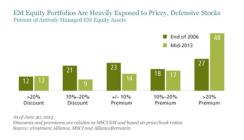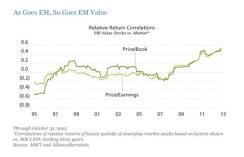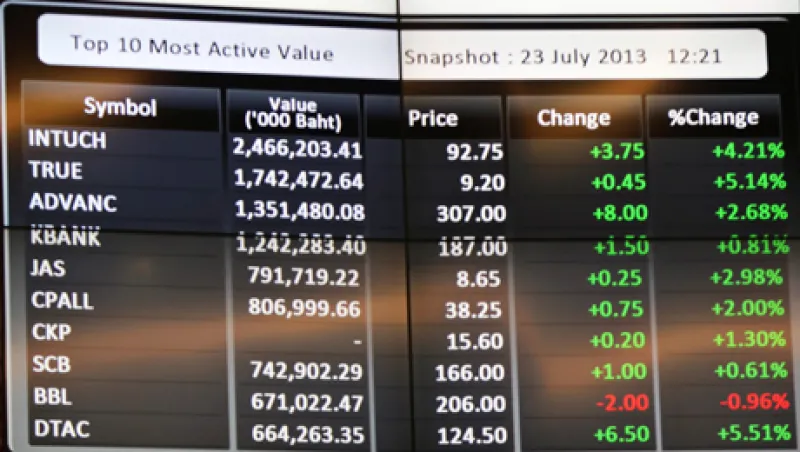Years of playing defense have left many emerging-markets equity portfolios laden with pricey, safe-haven stocks. We think these portfolios risk missing the big opportunity that’s brewing in value stocks, especially as emerging economies begin to stabilize.
The risk rally that has thundered across the developed markets over the past 18 months has largely bypassed the emerging world, which has responded more slowly than usual to improving developed-markets activity, while still uncertain about rich-world monetary policies. Nervous emerging-markets investors have been slow to abandon the relative safety of predictable, fundamentally stable stocks, while also shunning riskier stocks, regardless of valuation.
We think it’s time for a rethink. Nearly two thirds of actively managed emerging-markets equity assets are in stocks trading at premiums to the market of 10 percent or higher, with the largest portion skewed to those with premiums above 20 percent, as shown in chart 1. This trend is a big change from the past. As recently as 2006, allocations had been more evenly dispersed between expensive and cheap stocks, following a lengthy stretch of value outperformance in the wake of the bursting of the tech bubble.

This indifference to value seems pretty risky to us and carries considerable opportunity costs, especially if developing economies gain a firmer footing next year, as we expect. Why? Because, after prolonged underperformance, long-neglected, high-beta, cyclically sensitive stocks now dominate the value realm. These stocks are far more sensitive than usual to broad emerging-markets economic trends, which in turn are more sensitive to broad, global economic developments. Despite recent rebounds, these high-beta stocks continue to sell at some of the deepest discounts versus the overall emerging market in more than 15 years — and are extraordinarily cheap versus low-beta, defensive stocks, which trade near record premiums. Relative returns of deep-value stocks have become abnormally correlated with emerging-markets movements since the crisis, as seen in chart 2. What’s good for emerging-markets should be even better for emerging-markets value.

Value stocks typically lead market recoveries, as the anxieties that made them cheap in the first place subside and investors focus again on long-term fundamental prospects — not near-term controversies — to define the true worth of companies. Though value strategies haven’t worked very well lately, they have been highly successful in emerging markets in the past: The cheapest price-to-book quintile of emerging-markets stocks has outperformed the most expensive quintile by an annualized 7.5 percentage points since 1992.
Of course, much will depend on emerging-markets economic progress next year. Though the normally powerful symbiotic relationship between emerging and developed economies is facing new strains, it is far from broken, as we wrote in a recent post. Forward-looking indicators suggest that emerging-markets activity is finally getting a boost from reviving developed economies. Collective emerging-markets gross domestic product growth is still outpacing that of rich-world economies, and profit margins are higher. Emerging-markets balance sheet leverage has steadily improved since the Asian currency crisis of the late 1990s and is now significantly lower than at other periods of low emerging-markets stock valuations. In our view, even small improvements could drive outsize performance for emerging-markets stocks in general and value stocks in particular.
Emerging-markets investors need to consider the risks of overplaying the safety card. We think a rebalance to value is in order.
Henry D’Auria is chief investment officer of the emerging-markets value portfolio at AllianceBernstein. Morgan Harting co-heads AllianceBernstein’s emerging-markets multiasset portfolio team.
Get more on emerging markets.






